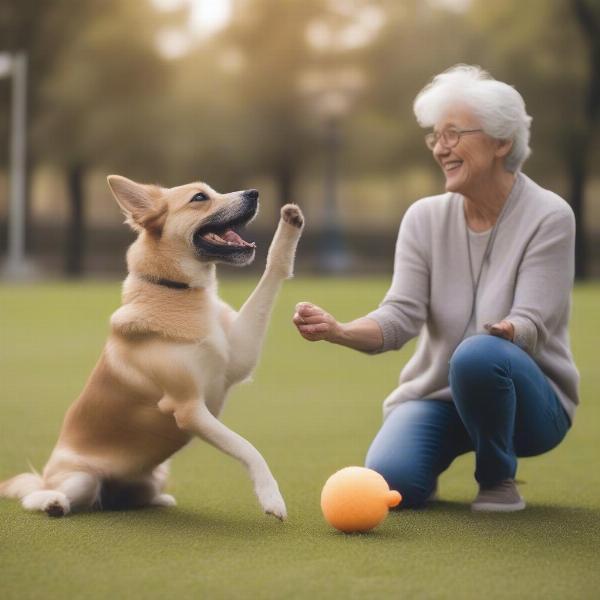As our canine companions enter their golden years, their nutritional needs evolve. Supplements for elderly dogs can play a vital role in supporting their overall health, mobility, and cognitive function. Choosing the right supplements can be a daunting task, but understanding your dog’s individual needs and consulting with your veterinarian is crucial for making informed decisions. This article will explore the benefits, types, and considerations for selecting appropriate supplements for your aging furry friend.
Understanding the Changing Needs of Senior Dogs
As dogs age, their bodies become less efficient at absorbing nutrients from food. This can lead to deficiencies that contribute to various health issues. Common age-related ailments like arthritis, cognitive decline, and weakened immune systems can be addressed with targeted supplementation. For instance, glucosamine and chondroitin can help support joint health, while omega-3 fatty acids can reduce inflammation and improve cognitive function.
Key Supplements for Elderly Dogs
Several supplements can benefit senior dogs, each targeting specific health concerns. Glucosamine and chondroitin are popular choices for supporting joint health and mobility. These supplements work together to cushion joints and reduce inflammation, alleviating the discomfort of arthritis. Omega-3 fatty acids, found in fish oil, can also combat inflammation and improve cognitive function. Additionally, antioxidants like Vitamin E and C can protect cells from damage and boost the immune system.
Joint Support: Glucosamine and Chondroitin
These two supplements are often combined to provide comprehensive joint support for senior dogs. Glucosamine helps repair cartilage, while chondroitin helps retain water in the joints, providing cushioning and reducing pain. Many commercial dog foods now include these supplements, but additional supplementation may be necessary for dogs with existing joint issues. Always consult with your veterinarian to determine the appropriate dosage for your dog.
Cognitive Function: Omega-3 Fatty Acids and Antioxidants
Omega-3 fatty acids, particularly DHA and EPA, are crucial for maintaining brain health in aging dogs. These fatty acids can help improve memory, learning, and overall cognitive function. Antioxidants, such as Vitamin E and C, can also protect brain cells from oxidative damage, further supporting cognitive health. Including these supplements in your senior dog’s diet can help maintain their mental sharpness and prevent age-related cognitive decline. dog food for elderly dogs can also play a vital role in supporting their changing needs.
Immune System Boost: Antioxidants and Probiotics
A healthy immune system is essential for senior dogs to ward off infections and illnesses. Antioxidants like Vitamin E and C can strengthen the immune response and protect cells from damage. Probiotics can also support gut health, which plays a crucial role in overall immunity. These supplements can help keep your senior dog’s immune system strong and resilient. If your my elderly dog won't eat, it’s important to address this issue to ensure they are receiving proper nutrition.
 Elderly dog playing in a park
Elderly dog playing in a park
Choosing the Right Supplements for Your Elderly Dog
When selecting supplements, consider your dog’s individual needs, breed, age, and existing health conditions. Consulting with your veterinarian is crucial to determine the appropriate supplements and dosages. Avoid over-supplementing, as this can have adverse effects. Look for high-quality supplements from reputable brands. dog grooming mona vale can also contribute to your elderly dog’s well-being and comfort.
Conclusion
Supplements for elderly dogs can be a valuable tool in supporting their health and well-being as they age. By understanding your dog’s specific needs and consulting with your veterinarian, you can choose the right supplements to enhance their quality of life and help them enjoy their golden years to the fullest. Remember, supplements are not a substitute for a balanced diet and regular veterinary care, but they can be a valuable addition to a comprehensive senior dog care plan.
FAQ
- When should I start giving my dog supplements? Consult your vet, but generally as dogs enter their senior years (around 7-8 years old, depending on breed and size).
- Are there any side effects of dog supplements? Some dogs may experience mild digestive upset. Always follow recommended dosages.
- Can I give my dog human supplements? Never give your dog human supplements without consulting your veterinarian. Dosages and formulations are different and can be harmful.
- How can I tell if the supplements are working? Monitor your dog for improvements in mobility, cognitive function, or other targeted areas. Consult your vet for regular check-ups.
- What if my dog refuses to take supplements? Try mixing the supplement with their food or using palatable supplement treats.
ILM Dog
ILM Dog is your trusted international resource for expert dog care advice, covering everything from breed selection and health to training, nutrition, and grooming. We are dedicated to providing reliable and practical information to dog owners worldwide, empowering them to provide the best possible care for their canine companions. We offer guidance on various topics, including dog breeds, health, training, nutrition, grooming, and product recommendations. Our expertise extends to helping you choose the right breed, understand your dog’s health needs, provide effective training, ensure proper nutrition, and maintain their hygiene. Contact us for personalized advice and support at [email protected] or +44 20-3965-8624.